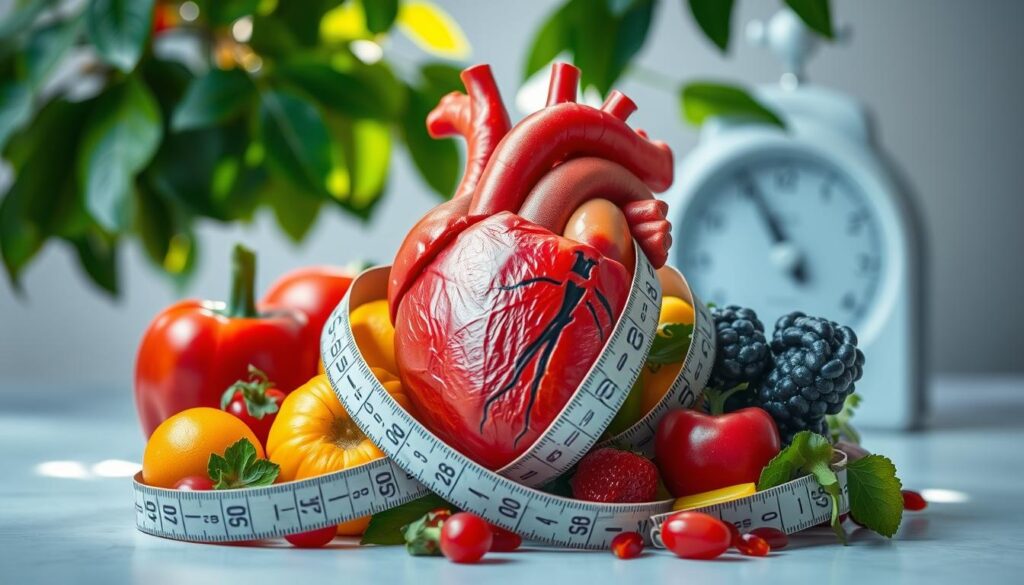Carrying extra weight can lead to high bad cholesterol levels. Every 10 pounds of extra weight makes the body produce 10 milligrams more cholesterol each day. Losing weight can lower cholesterol and reduce heart disease and diabetes risks.
The liver makes cholesterol for cell building, fat storage, and vitamin D. But too much bad cholesterol in the blood can cause heart attacks or strokes.
Key Takeaways
- Excess weight leads to higher cholesterol production
- Losing weight can significantly reduce LDL, total cholesterol, and triglyceride levels
- As little as 10 pounds of weight loss can improve cholesterol profile
- A heart-healthy diet and regular exercise are crucial for weight and cholesterol management
- Lifestyle changes should be the first line of defense against high cholesterol
Understanding the Connection Between Weight and Cholesterol Levels
Your weight and cholesterol levels are closely linked. Being overweight, especially around the middle, affects your lipoproteins. This includes LDL cholesterol, HDL cholesterol, and triglycerides levels.
How Extra Weight Affects Cholesterol Production
Extra weight means your body makes more free fatty acids. These fatty acids go to your liver in bigger amounts. This can make more cholesterol, especially LDL cholesterol.
Insulin resistance, common in the overweight, also raises free fatty acids in the liver. This affects cholesterol levels.
The Role of Body Fat in Cholesterol Management
Excess BMI can cause body-wide inflammation. This makes it hard for your body to manage HDL cholesterol and other lipoproteins. Losing weight, especially around the middle, can lower inflammation.
This helps your body manage cholesterol better.
Impact on Different Types of Cholesterol
Excess weight affects cholesterol differently. LDL cholesterol might go up at first when you lose weight. But it often goes back to normal or even goes down once you stop losing weight.
HDL cholesterol might go down when you’re losing weight. But it can go up after you stop losing weight.
“Weight loss through dietary or drug therapy can lead to a decrease in HDL-C levels, which may return to baseline or increase above baseline after weight loss stabilizes.”
It’s important to understand how your weight and cholesterol levels are connected. This knowledge helps you find ways to improve your heart health.
The Science Behind Will Weight Loss Lower Choles
Weight loss can greatly lower your cholesterol levels. It does this by reducing body fat and lowering inflammation. Studies show that losing at least 5% of body weight can lower LDL (bad) cholesterol and total cholesterol.
Men who lost 5% to 10% of their weight saw better results than women. This shows that losing weight is key to improving cholesterol levels.
But, losing less than 5% of weight only lowers triglycerides. This shows the need for significant weight loss for full cholesterol benefits.
“Losing just 10% of your body weight can help lower cholesterol and triglyceride levels, blood pressure, and the risk of Type 2 diabetes and certain types of cancer.”
Excess body fat affects lipid metabolism and cholesterol production. Extra weight, especially around the midsection, increases inflammation and insulin resistance. This can raise cholesterol levels.
By losing weight, you improve your body’s cholesterol management. This leads to better weight loss benefits.
For good cholesterol levels, a healthy weight is key. Aim for a 5-10% weight loss through diet and exercise. This will greatly improve your cholesterol and health.
How Excess Weight Influences Lipid Metabolism
Carrying extra weight can really mess with your body’s lipid metabolism. It affects things like triglycerides, HDL cholesterol, LDL cholesterol, and insulin resistance. Knowing how these are connected is key to keeping your cholesterol healthy.
Understanding Triglycerides Formation
Triglycerides are made in the liver from fatty acids and glucose. Having too much weight means your liver gets more fatty acids. This can raise your triglyceride levels. Plus, being overweight often means your body doesn’t use insulin well, making things worse.
Impact on HDL and LDL Levels
Being overweight can hurt both your HDL (good) and LDL (bad) cholesterol. You might have less HDL and more small, dense LDL. This mix is bad news for your heart health.
The Role of Insulin Resistance
Insulin resistance is a big problem with obesity. It makes your body use insulin poorly. This leads to more free fatty acids and triglycerides, and less HDL cholesterol. Losing weight and changing your lifestyle can help fix this.
Knowing how extra weight affects your triglycerides, HDL, LDL, and insulin resistance helps you take action. You can work on improving your lipid metabolism and lower your heart disease risk.
“Obesity is a major risk factor for co-morbid conditions such as coronary artery disease, hypertension, type 2 diabetes mellitus, respiratory disorders, and dyslipidemia.”
Benefits of Weight Loss on Cholesterol Profiles
Weight loss can change how you manage your cholesterol levels. It can also lower your risk of heart disease. Studies show that losing a little weight can make a big difference in your cholesterol.
One study found that losing 5% of body weight can lower bad cholesterol and triglycerides. This happens because losing weight helps your body use insulin better. This improves how your body handles cholesterol.
Experts say losing 5-10% of your weight can greatly improve heart health. Losing more weight can lead to even bigger benefits. For example, a big study showed that losing a lot of weight lowers total and bad cholesterol.
“Losing weight can be one of the most effective ways to lower your cholesterol and reduce your risk of heart disease. Even modest weight loss can make a big difference in your overall lipid profile.”
If you want to improve your cholesterol and heart health, focus on losing weight. Losing weight can lower bad cholesterol and triglycerides. It also reduces your risk of heart disease. Remember, losing a little bit of weight can make a big difference in your health.

Target Weight Loss Goals for Cholesterol Reduction
Even a little weight loss can help lower cholesterol. Studies found that losing 5-10% of your weight can greatly improve your lipid profile.
Minimum Weight Loss for Results
Those who lost 5–10% of their weight saw big drops in triglycerides and total cholesterol. For those at higher risk, losing 5-10% also lowered fasting glucose and triglycerides.
Optimal Weight Loss Percentages
Those who lost more than 10% saw even bigger improvements. For the best results, aim to lose 10% or more of your initial weight.
| Weight Loss Percentage | Cholesterol Improvements |
|---|---|
| 5-10% | Significant reductions in triglycerides, total cholesterol, and LDL |
| More than 10% | Even greater improvements in triglycerides, total cholesterol, and LDL |
Setting a weight loss goal of 5-10% can lead to big cholesterol improvements. For even better results, aim for a loss of 10% or more.
Lifestyle Changes to Lower Both Weight and Cholesterol
Getting a healthy weight and managing cholesterol are linked. Making lifestyle changes for both can greatly improve heart health. Here are some strategies to consider:
Embrace a Heart-Healthy Diet
Eating a healthy diet is key for lowering cholesterol and losing weight. Eat more whole, plant-based foods like fruits, veggies, whole grains, legumes, and healthy fats from olive oil, avocados, and nuts. Cut down on saturated fats to keep cholesterol levels low. Try to get only 5-6% of your daily calories from saturated fats.
Engage in Regular Exercise
Regular physical activity helps with weight and improves cholesterol. Aim for 150 minutes of moderate-to-vigorous exercise weekly, like brisk walking, swimming, or cycling. Even 20 minutes, three times a week, can help.
Quit Smoking
Stopping smoking is a big step for heart health. Smoking lowers HDL (good) cholesterol. Quitting can improve your cholesterol profile in just a few months.
By making these lifestyle changes, you can lower weight and cholesterol. This reduces heart disease risk. Remember, small, consistent steps lead to lasting heart health improvements.

Diet Strategies for Managing Weight and Cholesterol
Eating well is important for your weight and cholesterol. Choose foods low in fat and avoid bad fats. Pick whole-grain bread, pasta, and cereals for more fiber.
Choosing Heart-Healthy Foods
Eat lean proteins like grilled chicken or fish. Add lots of non-starchy veggies. Don’t eat too much red meat or processed foods.
Use soft margarines instead of butter or hard margarine.
Portion Control Guidelines
It’s key to control your food portions. Eat a quarter of your plate with lean protein, another quarter with whole grains. Fill the rest with veggies.
Eat smaller meals throughout the day. This helps with hunger and blood sugar.
Drink less alcohol and more water. This helps you stay healthy.
“Following a heart-healthy diet and maintaining portion control can significantly improve your cholesterol profile and support sustainable weight loss.”
Simple diet changes can help you manage your weight and cholesterol. This lowers your risk of heart disease and other health issues.
Exercise Requirements for Dual Benefits
Regular physical activity is key for losing weight and managing cholesterol. Aim for 150 minutes of moderate to vigorous exercise weekly. This can be brisk walking, jogging, cycling, or swimming.
Start with 20 minutes of exercise, three times a week. Then, slowly increase your routine.
Aerobic exercises that work many muscles are great for your heart and cholesterol. The American Heart Association says to keep your heart rate between 50% to 85% of your maximum during exercise.
Exercise is good for everyone, no matter your age. It helps prevent heart problems. When you eat healthy and exercise, you can manage your weight and cholesterol better. So, put on your sneakers, move, and take care of your heart today.

